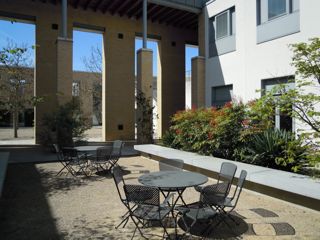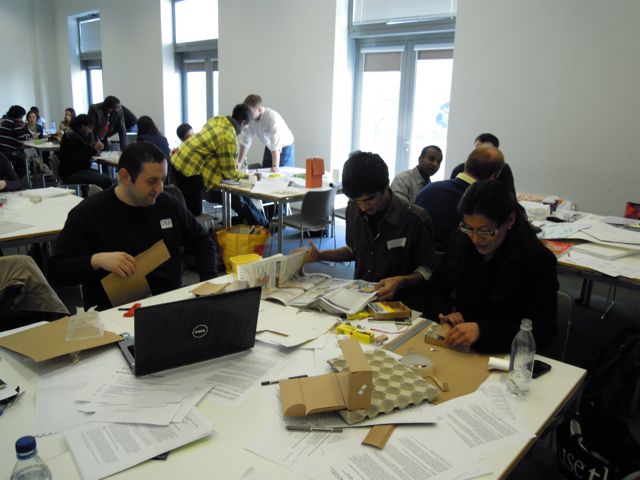The SAID Business School at Oxford has prime real estate – right across from the Oxford Train Station. The School is young (started in 1996) and therefore so is the building — with more security than Sauder for sure.
It is interesting to reflect on the “first time” experience of each business school (note to self — I should do that as I am going to visit quite a few over the next 2 months). As an aside, I find the initial sense of SAID to be quite cold — doesn’t immediately call out to students to hang out in the entry foyer. But — going farther into the building one finds a well-stocked cafe with high quality food and good access to outside spaces. The learning spaces that I experienced were nicely “flexible”.
SAID offers a BA in Economics and Management — and a 1-year Full Time MBA (Sauder’s is 15 months) along with a part-time Exec MBA.
One of my reasons for visiting SAID was to observe (and help where possible) a prototyping workshop organized by Lucy Kimbell – the Clark Fellow in Design Leadership at SAID Business School. Lucy teaches design and design management for the MBAs and researches designing for service. Previous to SAID she taught interaction design at the Royal College of Art. Lucy combines a very thoughtful and academically rigorous approach to design + business – an approach I have found to be very useful as I work to establish an appropriate approach for Sauder. Here’s Lucy.

Lucy’s blog is a good example of a constructively critical voice on the topic of design thinking. See her blog at: http://www.designleadership.blogspot.com. She has shared her current writing/thinking with me and I appreciate her generosity.
Back to the workshop. Lucy has created a partnership with the London College of Communications with faculty and students from the MDes Innovation & Creativity in Industry. Link: http://www.lcc.arts.ac.uk/MDes_innovation_and_creativity.htm
The workshop was designed to bring designers and MBAs together to explore prototyping. The project brief was: Post-operative remote monitoring sensory device base station. From the brief:
The Research and Development team at Cranfield Health has developed a new concept for remote health monitoring. The device communicates the patient’s recovery process to the medical team enabling hospital patients to return to their home environment at the earliest opportunity.
The design students were already “into” the project – they had developed some prototypes for the monitoring unit itself. They shared their progress and proto-types to date.
The intent of the day workshop (10am-5pm) was to work collaboratively to design a base for the device that had been already prototyped by the design students. So teams were formed with 1 designer and 2-3 MBAs. No process per se was provided to the teams. This was in fact the first time the MBA class had convened – I asked Lucy and she was going to be talking process at the first class in the next week. Not sure how it might have been different if they’d been exposed to a process in advance — might actually have made them intellectualize too much. Instead — they just dived in.
The day proceeded with completing a base station prototype (using materials like egg cartons, cardboard, plasticene and so on), doing a peer review with another team, making changes, presenting, voting and wrap-up. Prototypes ranged from ear-pieces to wrist-bands to gloves — and their product names were fun too — Nurse Betty, the Doc Dock, Medi-Glove, Kidometer.
It seemed that the most successful prototypes were ones where the teams had focused in on a specific user group — e.g. children and their parents. There was good discussion during the wrap about the challenges of having to make assumptions about “how” the devices were actually going to be used, their cost and the technology requirements.
The next phase will be the service and business modelling workshop on Wednesday May 5th. I am heading back to Oxford for the workshop — will be interested to see how the engagement in the prototyping informs the service and business modelling.
Stay tuned.


